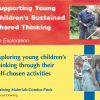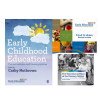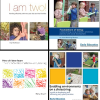Letter to the next Prime Minister
The letter below sets out our key asks for the next government.
The open letter below was sent to Ofsted in November 2023. Download Ofsted’s response
We the undersigned are writing to you about the recently published Ofsted document Best start in life part 1: setting the scene.
While we welcome Ofsted’s recognition of the vital role of the early years, we are concerned that as a scene-setting document for this strand of research, the review has a number of concerning deficiencies and does not position Ofsted as an expert voice on early years pedagogy and curriculum.
The report reads as if it relied solely on a small and incomplete review of the literature, not the rich and extensive peer-reviewed research evidence available. It also fails to reflect the wealth of excellent practice in the sector which inspectors must be regularly encountering. As individuals and organisations we would welcome the opportunity to work with you to ensure that the reviews of the Areas of Learning are a better reflection of the extensive research on early years pedagogy and curriculum which provide a sound basis for Ofsted’s judgements on quality, supporting both inspectors and practitioners.
Given the potential influence of the review, we urge you to review the current document and ensure future parts of the review are better balanced and grounded in the evidence. While the report states that “the principles do not specify what must be taught or how”, the implicit threat of being downgraded for not complying with what is set out in the report will inevitably influence what and how settings and schools teach. It would be worrying if the principles in the report were to be applied by either practitioners or inspectors in a narrow or simplistic way. We set out below concerns about some of the specifics of the report.
On the basis of this review, before Ofsted publishes its reviews of the seven areas of learning, we urge you to trial them with knowledgeable and experienced practitioners and researchers and engage with sector representative bodies. We would be delighted to help ensure that future documents make a more effective contribution to the debate about quality than the current review manages to do. Many of us were involved with the production of the ‘Getting it right in the early years foundation stage: a review of the evidence’ (which we are pleased to see you reference) and Birth to 5 Matters, which has been enthusiastically adopted across the early years sector because of the principled and evidence-based nature of its content. We hope you will take us up on this offer to ensure that Ofsted’s future curriculum review documents receive an equally warm welcome from the sector.
Yours sincerely
Beatrice Merrick, Chief Executive, Early Education
Michael Freeston, Director of Quality Improvement, Early Years Alliance
Stella Ziolkowski, Director of Quality and Workforce Development, National Day Nurseries Association
Liz Bayram, Chief Executive, Professional Association for Childcare and Early Years (PACEY)
Dr Sacha Powell, Chief Executive Officer, The Froebel Trust
Karen Chetwynd, Chief Operating Officer, Montessori Group
Professor Christine Pascal, Research Director, Centre for Research in Early Childhood (CREC) ; British Early Childhood Education Research Association (BECERA) Association
Professor Tony Bertram, Research Director, Centre for Research in Early Childhood (CREC) ; British Early Childhood Education Research Association (BECERA) Association
Karen Boardman, Chair, TACTYC and Head of Early Years Education, Edge Hill University
Paulette Luff, President OMEP UK, OMEP (World Organisation for Early Childhood Education) UK
Dominique Powell, Chair of national organisation SEFDEY and Award Leader Foundation Degree Education with Early Years pathway, Sector Endorsed Foundation Degrees in the Early Years (SEFDEY)/ Staffordshire University
Philippa Thompson, Principal Lecturer Early Childhood Studies and Co-Chair ECSDN, Early Childhood Studies Degrees Network (ECSDN)
Elaine Bennett, Early Years Specialist, Keeping Early Years Unique
Anna Ephgrave, Early Years Consultant and author , Creative Cascade UK Ltd & Keeping Early Years Unique
Sam Greshoff, Early Childhood Coordinator, Steiner Waldorf Schools Fellowship (SWSF)
Professor Cathy Nutbrown, President, Early Education
Tina Bruce, Honorary Professor University of Roehampton, Vice President, BAECE:Early Education
Nancy Stewart, Vice President, Early Education
Helen Moylett, Independent consultant , Early Education (Vice President)
Laura Henry-Allain MBE, Storyteller, Producer, Consultant and Educationalist , N/A
Dr Julie Fisher, Early Years Adviser and Visiting Professor of early childhood education, Independent
Kathryn Solly, Specialist Early Childhood Consultant, Trainer and Author , KSC
Professor Jan White, Consultant in learning outdoors in the early years, Early Childhood Outdoors
Dr Nikki Fairchild, Associate Head (Research and Innovation), University of Portsmouth
Aaron Bradbury , Principal Lecturer Early Childhood , Nottingham Trent University
Robin Duckett, Director, Sightlines Initiative
Pikler UK Association , Advocates for respectful provision from 0-3, Pikler UK Association
Carolyn Silberfeld, Chair Emerita, ECSDN
Valeria Scacchi , Research Officer , The Froebel Trust
Alison Tate, Senior Lecturer (Education), Nottingham Trent University
Felicity Thomas, Froebel Travelling Tutor, Froebel Trust
Krishan Sood, Senior lecturer, NTU
Dr Jane Read, Emeritus Fellow, University of Roehampton
Julie Kent, Senior Lecturer (Childhood), Nottingham Trent University
Stephanie Harding, Travelling Tutor , Froebel Trust
Dr Helen J Williams , Early Years Educator and consultant , Freelance
Di Chilvers, Advisory consultant in early childhood education, author, researcher and Early Education Associate , WatchMeGrow
Rebekah Gear, Nottingham Trent University
Kerry Murphy , Lecturer in Early Years & SEND , Goldsmiths University
Glenda Wyn Tinney, Senior Lecturer, UWTSD
Sue Robson, Honorary Research Fellow, University of Roehampton
meredith rose, Senior lecturer in Early Childhood Studies, Nottingham Trent University
Dr Sue Allingham, Independent Consultant , Early Years Out of the Box
Simon Davies, Senior Lecturer, BCU
Debi Keyte-Hartland, Early years consultant, trainer, lecturer, Independent
Julie Cigman, Early Years Consultant and author, Julie Cigman Early Years consultancy
Pete Moorhouse, EYFS consultant, Irresistible Learning
Fran Paffard, Chair of Governors , Comet Nursery School and Childrens Centre
Tamsin Grimmer, Early Years Consultant, lecturer and author, N/A
Julia Manning-Morton, Early Years Lecturer, author and consultant, Early Education, Froebel Trust, Pikler (UK) Association
Dr Nathan Archer, Director – International Montessori Institute , Leeds Beckett University
Professor Graham F Welch, Chair of Governors, Old Oak Primary School
Jo Gilks, Senior Early Years Educator, N/A
Sue Cowley, Chair of Preschool Committee , Stanton Drew and Pensford Preschool
Ruth Swailes, School Improvement and Early Years Improvement Advisor, Assure Education Limited
Liz Chesworth, Lecturer in early childhood education, University of Sheffield
Penny Borkett, Retired Senior Lecturer and author, Sheffield Hallam University
Chris Rolph, Director, Nottingham Institute of Education, Nottingham Trent University
Rishi Chauhan, Data Manager, NTU – NIoE
Dr Verity Campbell-Barr, Director of Plymouth Institute of Education , University of Plymouth
Dr Pam Jarvis , Chartered Psychologist , Retired
Thelma Miller, Retired Nursery School Headteacher, Froebel Travelling Tutor, The Froebel Trust
Debby Hunter MA, Principal, Annan School
Caroline Victoria Hutchin, Early Years Consultant and Associate for Early education, Early Education
Nicola Burke, Early Childhood Music Consultant, Independent
Beth Devereux , Early Education Consultant , Roots for Learning
John Siraj-Blatchford, Executive Member, OMEP UK
Ruth Pollington , Reception Class Teacher , Copford CofE Primary School
Ruth Mercer, Early Education Associate, Early Education
Gillian Reece-Jones , Early Years Consultant , Pikler UK Association and Sightlines Initiative
Dr Ian Cushing, Senior Lecturer in Education, Edge Hill University
Dr Helen Simmons , Senior Lecturer , University of Northampton
Sigrid Brogaard Clausen, Senior Lecturer , University of Roehampton
Leslie Patterson, Education Consultant, Finding the Magic in the Early Years
Rachel Tapping , Parent-child class leader and early years staff mentor, Balanced Beings
Sarah Dixon-Jones, Head Teacher, Federation of Houghton Community Nursery and Mill Hill Nursery School
Joan Heasman , Childcare Development Officer , Local Authority
Sue Greenfield , Emeritus Fellow, University of Roehampton
Dr Sharon Colilles, Senior Lecturer, Bath Spa University
Jackie Musgrave, Associate Head of School: Learning and Teaching, Early Childhood at the Open University
Dr Ulrike Hohmann, Associate Professor in Early Childhood Studies, University of Plymouth
Tim Hopkins, Trustee, Early Education
Sian Maddocks, EYFS Lead, Durham LA
Rebecca Carter Dillon, Lecturer in Early Childhood Studies and Education, University of Plymouth
Sasha Tregenza , Doctoral Teaching and Research Assistant , University of Plymouth
Elizabeth Wood, Professor of Education, University of Sheffield
Rosie Flewitt, Professor of Early Communication, Education and Social Research Institute, Manchester Metropolitan University
Joann Parsonage , Manager Owner , Karetakers Day nursery
Dr Louise Webber, BA Hons Early Childhood Studies Lecturer , University of Plymouth
Heather Lomas, Director, Little Explorers Nurseries LTD
Jan Holmes, Headteacher, Walton Lane Nursery School
Kevin Courtney & Mary Bousted, Joint General Secretaries , National Education Union
Peter Elfer, Honorary Research Fellow, University of Roehampton
Victoria Bamsey, Lecturer Early Years, University of Plymouth
Dr Catherine Gripton, Assistant Professor, University of Nottingham
Alice Bradbury, Professor of Education, University College London
Steve Grocott, Early Years Musician, Freelance
Helen Tovey, Nursery School Governor, Retired
Glen Hughes, Design and Marketing, Orangebox Training
The letter below sets out our key asks for the next government.
Early Education Associate, Debi Keyte-Hartland reflects on a recent commission by Balcarras Teaching School Hub In Gloucestershire to deliver a four-day course on Sustained Shared
DfE have issued an update to address the issue of parents wishing to claim their codes for the new entitlements who cannot do so because
Guest blog by Frances Giampapa and Claire Lee Introduction A wealth of evidence demonstrates the fundamental role played by early years (EY) education in shaping
UK early years curricula England The Early Years Foundation Stage statutory framework applies in England for early years provision for children from birth to 5.
The Department for Education has today published the two versions of the EYFS Statutory Framework which will apply from 4 January 2024: These incorporate the
The Department for Education has today published its response to the EYFS consultation conducted in the summer. The changes will be implemented from January 2024
by Katherine Gulliver Introduction Early Education was recently asked to review the special educational needs and/or disabilities (SEND) provision in the early years within one
Clare Devlin, Early Education Associate What aspects of physical development should we focus on within the Early Years Foundation Stage (EYFS) and other early years
By Debi Keyte-Hartland, Early Education Associate This article is based on one included in the Early Education Journal no 100. To access the full article
In this article, Kate Irvine from Bristol Early Years discusses the impact of practitioners engaging in a sustained process of CPD through cluster groups and
by Dr Jo Albin-Clark, Edge Hill University and Dr Nathan Archer, Leeds Beckett University Inspection in the news Being involved in education in England involves
The Department for Education (DfE) have published their response to the consultation on potential changes to staff:child ratios. The consultation received responses from nearly 10,000
Ofsted’s latest annual review highlights the impact of recruitment and retention challenges and finds a link between inspection outcomes and the proportion of graduates in
What are “Fundamental British Values”? by Vicky Hutchin The so-called “Fundamental British Values” form a part of the Prevent Duty, introduced in 2015 and last
The Ofsted early years curriculum review Best start in life part 1: setting the scene, has just been published, which they describe as being part of
Early childhood education today has been influenced by key figures such as Froebel, Montessori, Isaacs and MacMillan. Much recent research has supported their ideas although
Sustained shared thinking: An episode in which two or more individuals “work together” in an intellectual way to solve a problem, clarify a concept, evaluate
Early years pedagogy is the theory that informs the practice of teaching children in the early years. The pedagogical research has been carried out by
by Cathy Gunning What is reflective practice? Reading a book by Donald Schon early on in my career as a teacher opened my eyes to
The Early Career Framework has been designed by the Department for Education in England to support newly qualified teachers in England with a structured package of support
The following extracts from past early years teaching newsletters have a feature which supports your team dialogue around pedagogy and practice dilemmas and reflective practice.
Last updated Spring 2018. The preschools of the Reggio Emilia in Northern Italy inspire us with their pedagogy and practice in giving children rich encounters
In most cases, sound early years principles and practices are already in place in settings. The EYPP funding allows settings to review and refine what
Who was Friedrich Froebel (1782-1852) Born on 21 April 1782 Friedrich Froebel was a German educator who invented the kindergarten. He believed that “play is
This article by Early Education Associate Anni McTavish explores the term “cultural capital”, and what it might mean for early years practitioners and their settings.
Welcome to the e-book Child-Centred Competences for Early Childhood Education and Care. The book brings together four years of research undertaken by early childhood academics
Raymond Williams maintained, after years of examining constructs of culture and society that “Culture is one of the two or three most complicated words in






Early Education
2 Victoria Square
St Albans
AL1 3TF
T: 01727 884925
E: office@early-education.org.uk